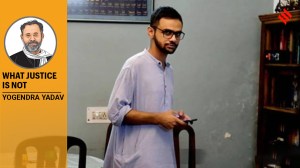Divorced Muslim women can claim maintenance under Section 125 of Criminal Procedure Code: SC
The Supreme Court was hearing an appeal by Mohd. Abdul Samad, who had been ordered to pay maintenance of Rs 20,000 to his ex-wife by a family court in Telangana.
 Justice Nagarathna said Section 125 CrPC would apply to all women and not just married women. (Express File Photo by Amit Mehra)
Justice Nagarathna said Section 125 CrPC would apply to all women and not just married women. (Express File Photo by Amit Mehra)The Supreme Court on Wednesday ruled that all married and divorced women, including Muslim women illegally divorced by pronouncement of “triple talaq”, are entitled to claim maintenance from their husbands under Section 125 of the Code of Criminal Procedure (CrPC), 1973, “irrespective of her personal law”.
In separate but concurring judgments, a Bench of Justices B V Nagarathna and Augustine George Masih held that the right of Muslim women to seek recourse to Section 125 will not be eclipsed by the provisions of the Muslim Women (Protection of Rights on Divorce) Act, 1986, enacted by the then Rajiv Gandhi government after the landmark Shah Bano judgment of 1985.
“The rights created under the provisions of the 1986 Act are in addition to, and not in derogation of, the right created under Section 125 of the CrPC,” Justice Nagarthana wrote.
Underlining the religion-neutral character of the provision, Justice Masih said: “Numerous decisions of this court went on to state that Section 125 of CrPC, 1973, is a measure for social justice to protect the weaker sections, irrespective of applicable personal laws of the parties”.
The court said that “the right to seek maintenance under Section 125 of CrPC, 1973, is invokable even during the sustenance of marriage and thereby is not contingent upon divorce.”
“If Section 125 of the CrPC is excluded from its application to a divorced Muslim woman, it would be in violation of Article 15(1) of the Constitution of India which states that the State shall not discriminate against any citizen only on the ground of religion, race, caste, sex, place of birth or any of them,” Justice Nagarathna said.
“A reading of Section 125 of the CrPC would indicate that… (its) intention… is to provide for a speedy remedy and prevent vagrancy by compelling the husband to support the wife. The provision is meant to achieve a social purpose. The reason being that after marriage, it is the duty of the husband to provide shelter and maintenance to the wife in the Indian context. Particularly, if she is unable to maintain herself. If he neglects or refuses to do so, the wife is legally entitled to enforce the said right by filing a petition under Section 125 of the CrPC, irrespective of any other right created in favour of the wife under any other law. Therefore, the passing of the 1986 Act, in my view, cannot militate against or dilute the salutary nature of Section 125 of the CrPC. The object of this provision is to save a wife, including a divorced woman, from deprivation and destitution,” she said.
“The statutory right to seek maintenance under Section 125 of the CrPC is… embedded in the text, structure and philosophy of the Constitution. Article 15(3), read with Article 39(e) manifests a constitutional commitment towards special measures to ensure a life of dignity for women at all stages of their lives. This ought to be irrespective of the faith a woman belongs to. The remedy of maintenance is a critical source of succour for the destitute, deserted and deprived sections of women. There can be no manner of doubt that it is an instantiation of the constitutional philosophy of social justice that seeks to liberate the Indian wife, including a divorced woman, from the shackles of gender-based discrimination, disadvantage and deprivation,” she said.
Section 125 of the CrPC states: “If any person having sufficient means neglects or refuses to maintain (a) his wife, unable to maintain herself, or (b) his legitimate or illegitimate minor child, whether married or not, unable to maintain itself, or (c) his legitimate or illegitimate child (not being a married daughter) who has attained majority, where such child is, by reason of any physical or mental abnormality or injury unable to maintain itself, or (d) his father or mother, unable to maintain himself or herself, a Magistrate of the first class may, upon proof of such neglect or refusal, order such person to make a monthly allowance for the maintenance… at such monthly rate as such Magistrate thinks fit…”
Reiterating its position
The Supreme court has reiterated a landmark position: that Muslim women are protected like women of other religions, and that Parliament’s 1986 law that attempted to overturn the Shah Bano judgment did not remove the protection available to them under Section 125 CrPC.
The ruling came on an appeal filed by Mohd Abdul Samad, who had been ordered to pay Rs 20,000 as monthly maintenance to his ex-wife by a family court in Telangana. The woman had moved the family court under Section 125 of CrPC stating that Samad had given her triple talaq. The HC, on December 13, 2023, said “that several questions are raised which need to be adjudicated” but “directed the petitioner to pay 10,000 as interim maintenance”.
Challenging this, Samad told the SC that the HC had failed to appreciate that the provisions of 1986 Act, which is a Special Act, would prevail over the provisions of Section 125 CrPC, which is a general Act.
Rejecting this, the SC said: “It is undoubtedly clarified by the Constitution Benches of this Court that the same cannot promptly be deemed to override any other rights so provided by the enactments of the legislature”.
“One cannot read Section 3 of the 1986 Act containing the non-obstante clause so as to restrict or diminish the right to maintenance of a divorced Muslim woman under Section 125 of the CrPC and neither is it a substitute for the latter. Such an interpretation would be regressive, anti-divorced Muslim woman and contrary to Articles 14 and 15(1) and (3) as well as Article 39(e) of the Constitution of India,” Justice Nagarathna said.
Referring to the September 2001 judgement in the Danial Latifi & Another vs Union Of India case, where a Constitution Bench of the SC upheld the constitutional validity of the 1986 Act, she said: “The constitutionality… was upheld only on the basis of the expansive, purposive and progressive interpretation that harmonised the rights under secular and personal law”.
“I therefore reiterate that the 1986 Act does not take away rights that divorced Muslim women have either under personal law or under Section 125 of the CrPC. I do not find any inconsistency between the provisions of the 1986 Act and Section 125 of the CrPC. Thus, a Muslim divorced wife is entitled to maintenance under Section 125 CrPC irrespective of her personal law,” she wrote.
Justice Nagarathna said the definition of “divorced woman” under the 1986 Act would include only a Muslim woman who has married and divorced according to Muslim law. But if a Muslim woman has been married under the Special Marriage Act, she cannot get the benefit of the 1986 Act. Such a Muslim woman, who is divorced, would have to proceed either under the provisions of the Special Marriage Act, 1954 and/or under Section 125 of the CrPC. “Therefore, the protective provision of Section 125 ought to remain available to every divorced Muslim woman to avoid the absurd outcome of a section of Muslim women being left remediless under the 1986 Act,” she said.







